Contact Campus Health Services
Flagstaff Area Crisis Numbers
- 24-Hour NAU Counseling Services: 928-523-2131
- NAU Police: 928-523-3611
- Arizona Statewide Crisis Line 844 534-4673 (HOPE)
National Crisis Numbers
- National Suicide Prevention Lifeline 1-800-273-8255 or text "Start" to 741-741
- The Trevor Lifeline (Suicide Prevention for LGBTQ Youth) 1-866-488-7386
- Veterans’ Suicide Prevention Lifeline 1-800-273-8255
81%
of students seen in Counseling Services agree or strongly agree that they are making healthier lifestyle choices as a result of their experience (NAU Counseling Services Survey, 2019)Bounce Back NAU
Explore NAU Health Promotion’s mental well-being and resilience campaigns—#BounceBackNAU and #MindsetMatters. Discover tools, tips, and support to take care of yourself, help others, and bounce back stronger.
Support Your Mental Well-being: #MindsetMatters
Believe In You Accordion Closed
It’s easy to doubt yourself, but what if you gave yourself a little more credit? Research shows that believing in yourself—having high self-esteem—can actually help you in school, in your relationships, and in your overall well-being. It’s not about thinking you’re perfect; it’s about recognizing your strengths and using them to navigate life’s challenges.
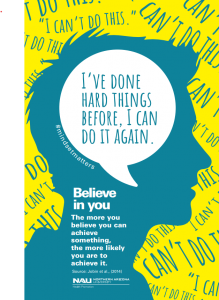
You bring value to the people around you. When you believe in yourself, your relationships tend to be stronger and more fulfilling. People with higher self-esteem are more likely to set boundaries, communicate openly, and surround themselves with supportive friends. Think about the people in your life—do you let yourself be seen and valued for who you really are?
You are capable of success. Confidence in yourself can help you stay motivated and push through challenges in school and work. Even if you’ve struggled before, that doesn’t mean you won’t succeed now. What’s one time you overcame something difficult? That same strength is still in you.
You deserve to feel good about yourself. Having high self-esteem isn’t just about feeling happy—it can actually help protect you from stress, anxiety, and burnout. It can also encourage you to take better care of yourself. What’s one thing you like about yourself?
You’re growing, and that matters. Building self-esteem takes time, and it starts with small steps. Maybe it’s setting a goal, celebrating a win (even a small one), or just reminding yourself that you are enough as you are. What’s one thing you can do today to remind yourself of your strengths?
Sources:
Orth, U., & Robins, R. W. (2022). Is high self-esteem beneficial? Revisiting a classic question. American Psychologist, 77(1), 5–17. https://doi.org/10.1037/amp0000922
For more support:
1. Book: The Six Pillars of Self-Esteem by Nathaniel Branden
This book breaks down the essential components of healthy self-esteem and offers exercises to build and reinforce it in your daily life.
2. App: Shine
Shine offers daily self-care prompts and motivational messages, helping users build a stronger sense of self and confidence.
3. Online Course: Building Self-Esteem and Confidence (LinkedIn Learning)
This course offers practical strategies and advice on building a positive self-image and improving self-esteem, perfect for college students navigating academic and personal challenges.
4. Campus Resource: Peer Jacks & Tutoring
Mentoring and academic support can help improve your self-esteem!
Expect Good Things Accordion Closed
It’s understandable to feel overwhelmed by stress, especially when it seems to pile up. However, research suggests that maintaining an optimistic outlook can help manage stress more effectively. A study published in Health Psychology examined how optimism influences stress-related cortisol levels—the hormone our bodies release in response to stress. The findings indicate that individuals with a more optimistic point of view tend to have a healthier cortisol response, even when facing higher-than-normal stress levels.
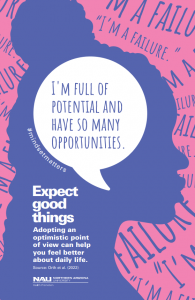
How Optimism Can Help:
-
Better Stress Regulation: Optimists are better at regulating their stress levels, which can lead to a more balanced stress hormones.
-
Healthier Responses to Challenges: By focusing on positive outcomes, optimists may experience less severe physical reactions to stress.
Practical Steps to Cultivate Optimism:
-
Reframe Negative Thoughts: When faced with a challenge, try to view it as a learning opportunity rather than a setback.
-
Set Achievable Goals: Break down larger tasks into smaller, manageable steps to create a sense of accomplishment.
-
Look to the future: Regularly acknowledge that good things have come to you and that they will again.
Remember, building optimism is a gradual process, but even small changes in perspective can make a significant difference in how you handle stress.
Sources:
Jobin, J., Wrosch, C., & Scheier, M. F. (2014). Associations between dispositional optimism and diurnal cortisol in a community sample: When stress is perceived as higher than normal. Health Psychology, 33(4), 382–391. https://doi.org/10.1037/a0032736
ScienceDaily. (2013, July 23). Optimism and stress could affect how long you live. ScienceDaily. https://www.sciencedaily.com/releases/2013/07/130723134538.htm
For more support:
1. Book: The Power of Optimism by Alan H. Cohen
This book provides actionable tips for shifting your mindset toward positivity and embracing life’s challenges with an optimistic outlook.
2. App: Happify
This app offers activities and games based on positive psychology to boost emotional well-being, resilience, and optimism.
3. Online Course: The Science of Well-Being by Yale University (Coursera)
Taught by Dr. Laurie Santos, this course teaches evidence-based strategies to improve happiness and mindset, focusing on fostering an optimistic outlook.
4. Campus Resource: Counseling Services
Set up an appointment with Counseling Services to work on developing a positive mindset and coping with challenges.
Embrace Gratitude Accordion Closed
It’s common to feel overwhelmed by life’s challenges, especially during college. However, embracing gratitude can be a powerful tool to enhance your well-being and resilience. A comprehensive report titled “The Science of Gratitude” by Summer Allen, Ph.D., delves into how cultivating gratitude can positively impact various aspects of life.
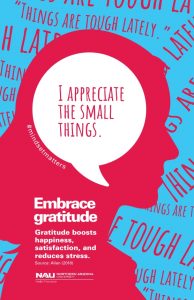
Understanding Gratitude:
Gratitude involves recognizing and appreciating the positive aspects of life and acknowledging the external sources of these blessings. It’s more than just saying “thank you”; it’s a deeper appreciation that fosters stronger connections and personal growth.
Benefits of Practicing Gratitude:
-
Enhanced Mental Health: Regularly practicing gratitude has been linked to reduced symptoms of depression and anxiety. By focusing on what you’re thankful for, you can shift your mindset away from negative thoughts.
-
Improved Physical Health: Grateful individuals often report better sleep quality and fewer physical ailments. This may be due to reduced stress levels and a more positive outlook on life.
-
Stronger Relationships: Expressing gratitude can strengthen your connections with others, leading to more supportive and meaningful relationships.
Practical Ways to Cultivate Gratitude:
-
Keep a Gratitude Journal: Regularly write down things you’re thankful for, no matter how small. This practice can help you focus on the positive aspects of your life.
-
Express Appreciation: Take time to thank those who have made a difference in your life. A simple note or verbal acknowledgment can go a long way in fostering gratitude.
-
Mindful Reflection: Set aside moments each day to reflect on positive experiences and the sources of your gratitude. This can enhance your awareness and appreciation of the good in your life.
Incorporating gratitude into your daily routine can be a transformative practice, especially during the demanding college years. By focusing on the positives and acknowledging the support around you, you can build resilience and foster a more fulfilling life.
Source:
Greater Good Science Center. (2018). The science of gratitude. Greater Good Science Center at the University of California, Berkeley. https://ggsc.berkeley.edu/images/uploads/GGSC-JTF_White_Paper-Gratitude-FINAL.pdf
For more support:
1. Book:
Invite gratitude and well-being into your life with short, daily writing prompts
2. App: Gratitude
This app encourages students to reflect on the positive moments of each day by creating a digital gratitude journal. It’s simple and effective for building a daily gratitude habit.
3. Online Course: The Science of Happiness (edX)
Offered by UC Berkeley, this course dives into the science of happiness and explores the positive impact of practicing gratitude on mental well-being.
4. Campus Resource: Stress Less Coaching
Talk with a peer about gratitude practices in the Health Promotion Zen Den. Stress less coaching is free and available Wednesdays from 10-1pm and Fridays 12-3pm. No appointment necessary.
Build Resilience: #BounceBackNAU
Everyone has strengths Accordion Closed
Instead of worrying about your weaknesses and questioning your worth, try to focus on your strengths. Knowing your strengths and further developing them helps to foster a more optimistic outlook which can be beneficial in many ways. Explore your strengths and find ways to apply them in difficult situations. Identifying your strengths can help you better respond to adversity and helps foster self-confidence.
- Everyone has strengths! When life has you down, remember your strongest qualities. For example, is kindness a strength of yours, or maybe love of learning? Find ways to incorporate these into your daily life and academics.
- Remember what you have overcome. Reflect on a time of adversity and recall personal qualities and strategies that you used to overcome that hard time. Look for ways to apply that strength now. You made it to college so don’t forget that accomplishment!
- Foster a positive view of yourself. Building confidence in your ability to solve problems and trusting your instincts, helps build resilience. What is one thing you have accomplished in this past year that you are proud of? It is important to celebrate victories, no matter how small!
- Grow your strengths and move toward your goals. Develop some realistic, achievable goals. Do something regularly, even if it is small, that enables you to move toward your goals. What is one small step you could take now to help move you toward your goals? Look for opportunities that will help you reach these goals like taking a training, attending a tutoring session or finding a friend who will hold you accountable.
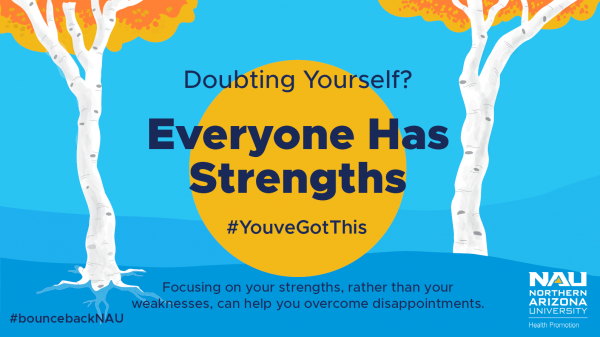
Resources:
- Find your character strengths through VIA Institute; click the ‘Take The Free Survey’ to identify your top 5 character strengths.
- This TED Talk Focusing On Strengths, Eva Katharina Herber encourages us to stop trying to fix our weakness start leveraging our personal strengths.
-
The Student Curriculum on Resilience Education is a tool to help increase awareness of your strengths and vulnerabilities in four key areas of resilience while in college.
It’s okay to fail Accordion Closed
Failure, it happens. It is never ideal and it can throw a wrench in plans, but it can help us grow and can be a wonderful learning opportunity. Do you know how to ride a bike? Well, you didn’t always and you probably had a few scary moments when learning. Learning to embrace failure and bouncing back when it happens ensures that you get outside your comfort zone and reach your goals.
- Don’t let failure stop you. Have you experienced a recent break-up with a romantic partner or failed your mid-term? Show yourself the same compassion you would show a close friend and remind yourself that failure happens, but is not forever.
- Make a plan. It is what we do after a failure that is most important. Will your failure stop you from moving forward or motivate you to figure out a new plan and push on? Take control of what you can, and let go of the things you cannot change. Learning from failure is imperative to growth.
- Remember, you are not alone in your failure. Many very successful people have had setbacks. For instance, J.K. Rowling, professors here at NAU, and even your friends and family have experienced setbacks. Surround yourself with people who support and encourage you to keep going.
- Perfection is an illusion. We put a lot of pressure on ourselves to be perfect and set unrealistically high expectations, but perfection is impossible. Remind yourself that you are human. Without change and failure, there would be no growth. Take some time to reevaluate your goals and expectations you have set for yourself.
- Take the chance; get outside of your comfort zone! Sometimes the fear of failure stops us from taking chances like applying for a job you really want, switching to a major you have dreamed of, or trying a new hobby. Don’t let fear stop you from getting the most out of life.
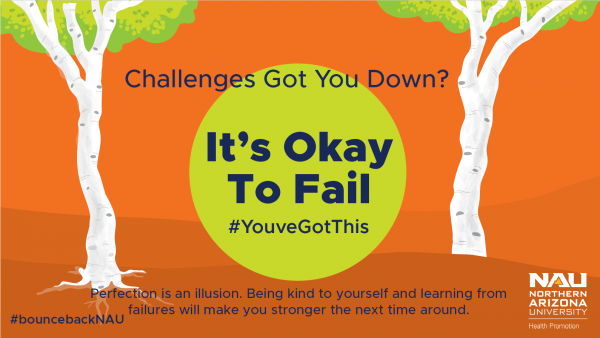
Resources:
- This Ted Talk by Guy Winch explores ways we can shift mindset after failing to avoid falling into a trap of helplessness.
Surround yourself with supportive people Accordion Closed
Social support is a very important part of being resilient and bouncing back. Social connections can increase our wellness, provide us with a sense of belonging, and allow us to feel supported by others, during the joyful times as well as the hard times. When we have strong, healthy relationships, we add value to our lives. Being able to ask for help, lean on others, and build social connections is key to bouncing back! You don’t have to have a huge crew, just a few strong social connections can make a big difference in your long term mental and physical health outcomes.
Ways to build stronger connections in your life:
- Develop strong social skills. Work on being an attentive listener, asking open-ended questions, finding things in common (favorite foods, major, hobbies, hometown), and using good eye contact (when culturally appropriate) – these can make connecting with others easier! Avoid interrupting others when they are talking. Express genuine interest in other people.
- Join a student organization – NAU has over 300! Connect with other students who have common interests.
- Be present. When you are out with friends or in class with peers, refrain from using tech and really relish in that time together. Be mindful that social media can sometimes give us a false sense of a connection and can be a distracting when spending time with people in real life.
- Make a difference. Volunteer on campus or in the community – help others, build your resume, and meet new people.
- Find a new hobby. Try something you have never done before and look for other newbies around so you can learn together.
- Find an on-campus job. Consider applying for a job on campus to meet new people, make some extra money, and build better communication skills. Developing these “soft skills” can help you land that dream job after college!
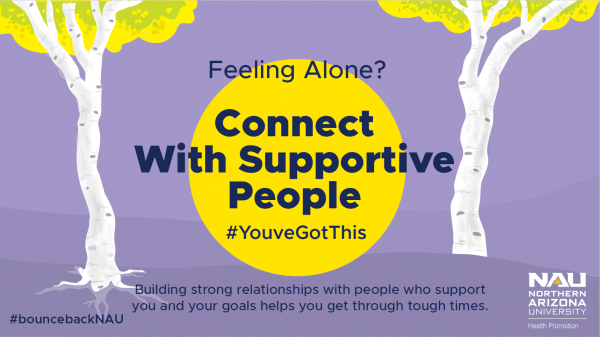
Resources:
- This TED talk will explore the three requirements for healthy friendships. Watch Frientimacy and then take a moment to reflect on friendships in your life.
- How is your social capital? Check out this quiz and see if there are any improvements you can make.
- Learn more about the benefits of social connection here.
Develop a self-care plan Accordion Closed
Stress is our body’s reaction to something we perceive as a challenge or a threat. Some stress is normal and can actually be good for us (motivates us to study for an exam), but we want to be mindful of prolonged, chronic stress that can be harmful to our health, wellbeing, and academic success. When we regularly engage in self-care and stress management practices, our body is better primed and prepared to respond to stressors. For example, think of responding to stress when you’re sleep deprived vs. when you’re well rested. Engaging in regular self-care, prioritizes your well-being and contributes to better emotional health, physical health and academic performance.
- Strive for Balance. Find a balance between academics, social time, work, responsibilities, and self-care. When we devote all of our time to one thing, we begin to neglect other areas of our life causing stress and imbalance. Try to build a schedule (and stick to it) that includes a time each day for movement, studying, and at least one day/night of fun in your week. Avoid over committing when you can.
- Be aware of your stress triggers. Our body gives us subtle signs when we are starting to get stressed (tension, appetite changes, anxiousness, etc.). When you feel stress coming on, take some extra time to engage in self-care. Call a friend, take a walk, make sure you’ve eaten, or just find a few minutes to chill.
- Learn ways to relax without technology. While Netflix can feel relaxing and enjoyable, there are ways to relax that create a relaxation response in our body. We can elicit this by engaging in deep-breathing exercises, meditation, and guided imagery. Consider stopping into Meditation Monday in Health Promotion, taking a few deep breathes outside, and being mindful of how tech affects your stress levels.
- Seek support. Do not hesitate to seek support when stress becomes unmanageable. Students can get support through Counseling Services, Health Promotion, the Academic Success Centers, and more!
- Create a self-care routine. Find a plan that fits your schedule and needs!
- Aim for 7-9 hours of sleep most nights
- Maintain personal connections with others
- Organize your space
- Utilize tools to manage your time
- Find an exercise or movement you enjoy
- Spend time in nature
- Eat a balanced diet that includes plenty of fruits and vegetables
- Allow yourself to say “no” to unnecessary things when you are feeling overwhelmed
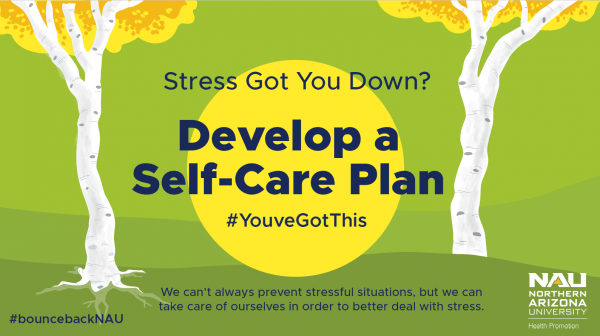
Resources:
- The Stressbusters Wellness app offers rapid relaxation tracks, videos, and stress-reducing tools, and a calendar full of campus and community wellness events updates like PAWS Your Stress and Meditation Monday. NAU Students receive free access to this app! Download the Stressbusters App here: Apple or Google Play.
- Kelly McGonigal explains how we can reframe our perception of the stress response and use it to our advantage, resulting in less harm to our health and wellbeing.
- The APA explains that self-care is not only for crisis situations, but for the day-to-day maintenance.
- Need some new self-care ideas? Check out Active Minds’ extensive list of activities to help you reenergize.